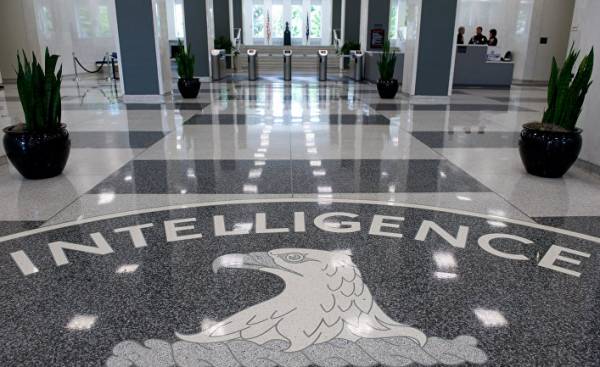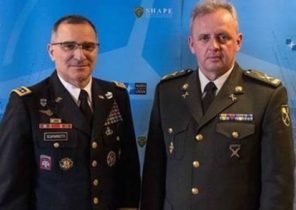
The January report of the intelligence agencies of the USA formed the basis for a series of hearings in Congress on the question of Russian intervention in the American elections in 2016, and very soon acquired an almost canonical character which prevent critical to its authors and their findings. However, there is one major problem: these supposedly definitive and clear findings in fact are not.
January 6, the office of the Director of National intelligence published a report entitled “evaluation of the activities and intentions of Russia in American elections” (Assessing Russian Activities and Intentions in Recent U. S. Elections). This document was called “declassified part of a top secret report” containing “findings are identical to findings reported in a top secret report.” It was stated that the report “includes estimates and judgments, compiled and coordinated the Central intelligence Agency (CIA), Federal Bureau of investigation (FBI), national security Agency (NSA), and based on information collected and processed by these agencies.”
Report of the National intelligence, national intelligence reports, should reflect the considered opinion of the us intelligence community. Documents such as the report on the intervention of Russia, to the exclusive competence of the National intelligence Council, whose mission is to serve “the organizer of the cooperation within the intelligence community” through the work of the officers of national intelligence, that is intelligence community experts in various fields, including those such as Russia and cyber attacks.
Although this report was published with the approval of the National intelligence Council, he did not have on its title page notes “This is an IC-Coordinated Assessment,” which almost always accompanies the documents of the National intelligence Council. Moreover, the document did not specify the identification number which indicates, under whose guidance was drawn up this report on Russia. (Typically such documents specify the name of the officer of national intelligence or Agency responsible for their preparation.)
Simply put, the report on Russia is not a product of collaboration as a coordination tool is the national intelligence Council is not directly involved in its drafting, and no officer of the national intelligence did not direct the process of its preparation. Moreover, it is also impossible to say that the report on Russia was the product of joint work of the CIA, the NSA and the FBI: although analysts of these departments, and participated in its preparation, they were part of the separate secret working group operating under direct supervision of the Director of the CIA, that is not within their agencies or departments.
Thus, such deliberate distortion of information about the authors of the report on Russia casts a shadow on the reliability of the document analysis and the materials on which are based the conclusions contained therein. This becomes even more obvious if to consider the report in terms of how it should look like a coordinated process of evaluation (“IC-coordinated assessment”), and in the broader context, including the mistakes that intelligence has made in the search for Iraqi weapons of mass destruction, and the lessons she learned from that experience. However, in the case of the report on Russia, none of those lessons were not taken into account.
The secret source
In the summer of 2015 the us intelligence community has been collecting information indicating that some foreign entities, presumably, the Russians conducted a series of hacker attacks against government and civilian systems in the United States. The first reports about this cyber intrusion came from the government communications Headquarters is a British intelligence Agency that monitors communications and signals of interest for intelligence. The headquarters recorded a surge in “phishing attacks” directed against a variety of American organizations, and reported to the NSA via the existing communication channels.
One of the victims of these phishing attacks became the national Committee of the Democratic party.
A malicious program through which carried out these attacks, very reminiscent of those viruses that previously were used by Russian hackers linked, according to experts in the field of cybersecurity, with the Russian Federal security service. The NSA and the FBI started to monitor this wave of attacks, informing the organizations of victims, including the national Committee of the Democratic party, that their systems have been compromised.
In addition to these phishing attacks, as reported by the national Committee of the Democratic party, its experts have recorded another attempt of hacking its servers in April 2016. The Committee invited experts to a private company Crowdstrike, that they understood this, despite the fact that at the time they were actively discussed with the FBI the details of earlier attacks. Experts from Crowdstrike said they found traces of another hacker attack, which, in their opinion, it was the Russian Main intelligence Directorate. Oddly enough, the national Committee of the Democratic party did not attempt to discuss their findings with experts from the FBI or transfer their servers to the FBI for the study, and instead turned to the newspaper Washington Post, which is 22 June 2016 published the conclusions of the experts at Crowdstrike, put the responsibility for a cyber intrusion on the Russian intelligence service.
Conclusions about the Russian origins of the hacker attacks, which insisted the experts at Crowdstrike and which were published in the Washington Post, has acquired a special political significance within the United States, where in July 2016, on the eve of the democratic National Convention, where Hillary Clinton was to announce the candidate from Democratic party on presidential elections, the Wikileaks website appeared emails, stolen from servers of the national Committee of the Democratic party, which eventually attacked the election campaign of Clinton. Despite the claims of the founder of the website Julian Assange (Julian Assange) that these letters were given to them not by the Russians, the campaign headquarters Clinton immediately said the opposite, stressing that the publication of the emails on the Wikileaks site became part of the Russian campaign against Hillary Clinton.
As reported by the newspaper the Washington Post, around this time, CIA Director John Brennan (John Brennan) has gained access to extremely secret report drawn up by the intelligence services of a foreign state. These services stated that they were able to penetrate the systems of the nearest environment of the Russian leadership is so deep that they can quote the words of the President of Russia Vladimir Putin, uttered at the moment when he voiced Russia’s goals in US elections in 2016: to ensure the defeat of Hillary Clinton and to promote the election of her Republican rival, Donald trump. In early August, about the report said President Barack Obama and several of his advisers, who were ordered not to disseminate this information.
The controversial nature of this report — in terms of its sources and contents — was the impetus for the investigation of Russia’s intervention in the American electoral process, which took the US intelligence community. The problem was that this investigation began not in the intelligence community as such, but rather (as reported by the publication Washington Post) working group, which included “several dozen analysts from the CIA, NSA and FBI are” specially selected by the CIA Director. The group worked on the territory of the headquarters of the CIA, and “its activities were hidden from the rest of the intelligence community”.
Thus was created a closed group of analysts who worked in complete isolation from the rest of the intelligence community of the United States. The initial position of their work — that Vladimir Putin personally oversaw the Russian interference in presidential elections in the US to tip the scales in favor of Donald trump — never been in doubt, despite the fact that its source was only one report received from the intelligence Agency of a foreign state. President Obama instructed the us intelligence community to conduct a comprehensive investigation into Russia’s interference in elections. In the result, intelligence experts began to re-analyze the reports based on the premise that the direct involvement of Putin, that eventually formed the extremely disturbing picture of the Russian large-scale campaign aimed at undermining the foundations of the electoral process in the United States.
These new reports are regularly transmitted to the elected members of Congress (heads of committees of chambers for investigation and party leaders), starting from September 2016. Almost immediately after that, members of the Democratic party began to demand that the President publicly called on Putin and Russia accountable for meddling in the election. The intensity of these demands intensified after the presidential elections in November 2016, at which Donald trump won a victory over Hillary Clinton. Intelligence gathered after the election — when considered in the light of the assumption that Putin and Russia have tried to reach election trump — seemingly confirmed the worst suspicions of intelligence experts and their clients in Congress (particularly Democrats).
The intensity of the calls to publish the proceedings and conclusions of the intelligence confirming Russia’s intervention in the American elections, continued to grow until the 9th of December, 2016, President Obama instructed the us intelligence community to prepare a secret report on Russia’s intervention.
This report was prepared by 29 December, and on the same day, the President got acquainted with him. The working group Brennan spent the lion’s share of the analytical work that finally secured a starting position on the Russian intervention taken from the report of the intelligence services of a foreign state, which served as the basis for initiating this process in early August. President Obama expelled from the US, 35 Russian diplomats and shut down two of the Russian diplomatic complex, which, according to experts, the FBI was used to conduct surveillance of Americans. Obama also imposed new sanctions against Russian individuals and legal entities, including those who were linked to Russian intelligence, in response to Russia’s intervention in the American electoral process, the details of which are reported in the report of the intelligence community.
Don’t forget about the “Twisted ball”
In any meaningful discussion of the analytical processes involved in the preparation of the report on Russia, it is necessary to take into account one extremely important fact that is often overlooked, namely the report entitled “Iraq’s programs to develop weapons of mass destruction”, made in 2002. This report will go down in history as the embodiment of one of the greatest failures of American intelligence in history. The Commission of U.S. intelligence on weapons of mass destruction, established in accordance with presidential decree of 2004 to investigate the causes of this failure, came to a merciless conclusion: “We found that almost all conclusions regarding weapons of mass destruction made before the war, was fundamentally flawed. This was a serious intelligence failure”. The problem was not only in erroneous conclusions. As mentioned in the Commission’s report, “there were serious shortcomings in how these conclusions were communicated to the political leadership.” In short, the whole process of reporting on weapons of mass destruction in Iraq was completely untenable.
After the September 11 attacks, in 2004, Congress authorized the establishment of the office of the Director of National intelligence in an attempt to ensure the smooth exchange of information between the various agencies constituting the U.S. intelligence community to continue to prevent such lapses of intelligence, like those who prevented to know in advance and prevent the September 11 attacks. Although this unit was established after the publication of the report on weapons of mass destruction in Iraq, and although the basis of its creation were reasons more directly related to the September 11 attacks, and not Iraq, the Commission on forces and means of intelligence believed that it was a step in the right direction, i.e. towards addressing a number of systemic deficiencies that led to failure in Iraq. Moreover, the Commission proposed a list of recommendations concerning the organization of the us intelligence community, the implementation of which was to prevent such failures, as the failure in Iraq.
One of those recommendations involves the creation of the post of “head of mission” which was to “ensure that the analytic community adequately responded to key needs in high-priority issues.” One of the ways through which the heads of missions had to achieve this goal was to stimulate “competitive analysis”, which should guarantee that “the final intelligence reports will reflect all data and competing points of view of analysts from all agencies of the intelligence community.” So thought the Commission, the heads of missions will be able to “prevent evidence of so-called templated or group thinking among analysts.”
The Commission proposed some other recommendations. In particular, it is also recommended that the Director of National intelligence to insist on the mandatory requirement to conduct alternative analysis and alternative hypotheses in response to the more formal conclusions. Thus, the Director of National intelligence will be able to guarantee that future exploration will not make such mistakes, like the one she made in Iraq, arguing that Saddam Hussein got rid of all its stockpiles of weapons of mass destruction.
Most of these recommendations were approved by President Bush and was adopted by the office of the Director of National intelligence. The head of the National center for counterintelligence, National center for counter proliferation of weapons of mass destruction and the National centre for counterintelligence and security has become the current leaders of national intelligence, and the officers of national intelligence, working under the auspices of the National intelligence Council, became regional leaders of national intelligence. In 2011 was created the new position of national intelligence officer for cyber security, and in 2015 created a new Center for integrating intelligence about cyber threats.
The CIA has followed suit, starting the implementation of the program, which was abolished by the powerful regional offices that have dominated the Agency since its founding in 1947, and in their place were created new “centers of mission management” headed “heads of missions”, which became the most experienced high-ranking officers of the CIA. Now there is no “control center missions in cyberspace” as such. Instead, in 2015, the CIA set up the Directorate of digital innovation officers which support the work of existing functional and regional centres.
The CIA received permission for the implementation of the alternative analysis in its work after the September 11 attacks. Instead of trying to copy this process, the Director of National intelligence in 2015 has published a new analytical standards, which required the inclusion of “analysis of alternatives” — a systematic evaluation of different hypotheses that can explain certain phenomena — to all analytic products.
All these new mechanisms were at the time of “phishing attacks”, recorded by the Center for government communications UK in the summer of 2015, at a time when in the summer of 2016 was the stolen e-mails stored on the servers of the national Committee of the Democratic party, and when Brennan received the report of the intelligence service of a foreign state, stating the direct involvement of the President of Russia Vladimir Putin to Russia’s intervention in the presidential election of 2016. However, none of these “lessons learned” were not taken into account and were not used in the process of compiling a report on Russia.
Adopted at the beginning of the process the decision of Brennan on the establishment of the ad hoc working group, isolated from the rest of the intelligence community, contributed to the fact that any end product of this working group could not be based on a collective analysis of the resources available throughout the national intelligence community, and could not be considered a reflection of the considered opinion of the intelligence community. Simply put, the report on Russia was not based on close cooperation of all representatives of the intelligence community, which lies at the basis of the credibility of such reports.
Excessive dependence on one single source in a foreign intelligence led to the fact that Brennan and his working group have made the same mistake, which was committed by the intelligence community on the eve of the Iraq war, when it built all of its conclusions on the basis of incorrect data received from one source in a foreign intelligence, known as “Curveball”. We know almost nothing about the nature of secret source of information that Brennan was used to confirm accusations against Russia. We can assume that it could be the intelligence services of Estonia, which managed to penetrate into Russian governmental organizations and who have a deep hostility towards Russia, which should alert those who try to manipulate the policy of America towards Russia as well as opposition politicians of Iraq (comes to mind is Ahmad Chalabi (Ahmed Chalabi)) tried to manipulate the policy of America towards Iraq.
The approach, which followed the working group Brennan in the process of analysis of the actions of Russia and its President, is very similar to the analytical blinders that have prevented the intelligence community of the United States to objectively assess the aims and intentions of Saddam Hussein and his inner circle, when we are talking about weapons of mass destruction. In the report on Russia States that “many of the key judgments in this report are based on numerous information from a variety of sources and consistent with our view of Russia’s actions”. This statement is a major sign of a trend towards “group think.” Moreover, if we remember that most of these “numerous” was ex-post adjusted to its original position, drawn from one single source in the exploration of a foreign state, the statement loses all its point.
The problem is also that the American intelligence community a pretty poorly versed in the peculiarities of the decision-making process of the Russian President and a poor understanding of the personality of Vladimir Putin. In the past the U.S. intelligence community has steadily followed a long-established understanding of how Saddam Hussein will have to think and make decisions, so it simply failed to realize the fact that in the summer of 1991, he could be ordered to destroy all its stockpiles of weapons of mass destruction and that he was telling the truth, stating subsequently that Iraq has no more weapons of mass destruction.
President Putin has repeatedly stated publicly that Russia has not interfered in the U.S. presidential election. However, those who relied on the findings of the intelligence report on Russia, calling them irrefutable evidence to completely reject Putin’s denials. However, nowhere in the report, in Russia there is no single evidence that the experts who prepared it, had something even remotely resembling “consider alternative hypotheses”, which, according to the decision of the Director of National intelligence, is a required component of any such analytical process. There is also no evidence of attempts to assess contrary to common sense hypotheses, which insists the CIA — like the hypothesis that President Putin may be telling the truth.
Throughout its history, the national intelligence Council was dealing with such sources of information whose secrecy was much higher than the degree of secrecy of the source of Brennan in the exploration of a foreign state. In this Council there are two experts who could undertake such a project, as the preparation of a report on Russia, namely the national intelligence officer for cyber security and the head of the mission of the Center for missions in Russia and Eurasia. If you follow the logic, they both had to bring to this task, given that in this case it was about cyber intrusion and about the intentions of Russia.
Excuse that the source of Brennan was too secret to his identity could reveal to these two experts and analysts who were under them are simply absurd: both of these expert have the right of access to the most secret intelligence information, and, moreover, they are required to monitor the implementation of projects such as the investigation of Russia’s intervention in the American electoral process.
President trump many times criticized for what it is with unnecessary disdain for American intelligence community and that he repeatedly referred to the failure of us intelligence in the case of Iraqi weapons of mass destruction in an attempt to downplay the significance of the reports of the intelligence community, including the report of Russian interference in presidential elections in 2016. Moreover, the President made another of your comments, being in a foreign country (Poland) before the first personal meeting with President Putin held on the sidelines of the summit Big twenty in Hamburg where one of the topics on the agenda was the topic of the intervention of Russia.
Aside from the arguments about the reasonable choice of time and place to publish such comments, the content of the statements of the President seems to be quite common. Commenting on the consensus of the us intelligence community regarding the conclusions contained in the report on the Russian intervention, President trump said: “I heard that there were 17 agencies [which reached consensus in the issue of Russian interference]… actually there were three or four. Not 17”.
Trump continued: “In fact, nobody knows anything. No one knows… I remember how I sat and listened about Iraq — weapons of mass destruction — all was 100% sure that Iraq has weapons of mass destruction. And what happened next? This led to a gigantic catastrophe. They made a mistake.”
And in both cases the President was right.
Scott Ritter is a former intelligence officer of the marine corps, who worked in the Soviet Union over the implementation of agreements on arms control, worked in the Persian Gulf during operation “desert Storm” in Iraq, where he oversaw the deactivation of weapons of mass destruction.






